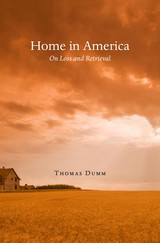
An extraordinary inquiry into the meaning of home, through explorations literary and political, philosophical and deeply personal, by the acclaimed author of Loneliness as a Way of Life.
Home as an imagined refuge. Home as a place of mastery and domination. Home as a destination and the place we try to escape from. Thomas Dumm explores these distinctively American understandings of home. He takes us from Thomas Jefferson’s Monticello and Henry David Thoreau’s Walden to Laura Ingalls Wilder’s little house on the prairie and Emily Dickinson’s homestead, and finally to the house Herman Wallace imagined and that sustained him during his forty-one years of solitary confinement at Angola State Penitentiary.
Dumm argues that it is impossible to separate the comforting and haunting aspects of home. Each chapter reveals a different dimension of the American experience of home: slavery at Monticello, radical individuality at Walden, Indian-hating in the pioneer experience, and the power of remembering and imagining home in extreme confinement as a means of escape. Hidden in these homes are ghosts—enslaved and imprisoned African Americans, displaced and massacred Native Americans, subordinated homemakers, all struggling to compose their lives in a place called home.
Framed by a prologue on Dad and an epilogue on Mom, in which the author reflects on his own experiences growing up in western Pennsylvania with young parents in a family of nine children, Home in America is a masterful meditation on the richness and poverty of an idea that endures in the world we have made.
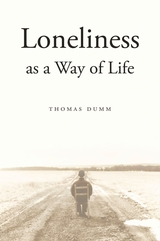
“What does it mean to be lonely?” Thomas Dumm asks. His inquiry, documented in this book, takes us beyond social circumstances and into the deeper forces that shape our very existence as modern individuals. The modern individual, Dumm suggests, is fundamentally a lonely self. Through reflections on philosophy, political theory, literature, and tragic drama, he proceeds to illuminate a hidden dimension of the human condition. His book shows how loneliness shapes the contemporary division between public and private, our inability to live with each other honestly and in comity, the estranged forms that our intimate relationships assume, and the weakness of our common bonds.
A reading of the relationship between Cordelia and her father in Shakespeare’s King Lear points to the most basic dynamic of modern loneliness—how it is a response to the problem of the “missing mother.” Dumm goes on to explore the most important dimensions of lonely experience—Being, Having, Loving, and Grieving. As the book unfolds, he juxtaposes new interpretations of iconic cultural texts—Moby-Dick, Death of a Salesman, the film Paris, Texas, Emerson’s “Experience,” to name a few—with his own experiences of loneliness, as a son, as a father, and as a grieving husband and widower.
Written with deceptive simplicity, Loneliness as a Way of Life is something rare—an intellectual study that is passionately personal. It challenges us, not to overcome our loneliness, but to learn how to re-inhabit it in a better way. To fail to do so, this book reveals, will only intensify the power that it holds over us.
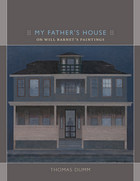
Dumm first became acquainted with Barnet and his paintings in 2008. Given his scholarly focus on the lives of ordinary people, he was immediately attracted to the artist's work. When they met, Dumm and Barnet began a friendship and dialogue that lasted until the painter's death in 2012, at the age of 101. This book reflects the many discussions the two had concerning the series of paintings, Barnet's family, his early life in Beverly, and his eighty-year career as a prominent New York artist. Reading the almost gothic paintings in conversation with the writers and thinkers key to both his and Barnet's thinking—Emerson, Spinoza, Dickinson, Benjamin, Cavell, Nietzsche, Melville—Dumm's haunting meditations evoke broader reflections on family, mortality, the uncanny, and the loss that comes with remembrance.
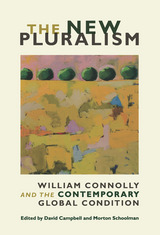
The contributors show how Connolly has continually revised his ideas about pluralism to take into account radical changes in global politics, incorporate new theories of cognition, and reflect on the centrality of religion in political conflict. They engage his arguments for an agonistic democracy in which all fundamentalisms become the objects of politicization, so that differences are not just tolerated but are productive of debate and the creative source of a politics of becoming. They also explore the implications of his work, often challenging his views to widen the reach of even his most recently developed theories. Connolly’s new pluralism will provoke all citizens who refuse to subordinate their thinking to the regimes in which they reside, to religious authorities tied to the state, or to corporate interests tied to either. The New Pluralism concludes with an interview with Connolly in which he reflects on the evolution of his ideas and expands on his current work.
Contributors: Roland Bleiker, Wendy Brown, David Campbell, William Connolly, James Der Derian, Thomas L. Dumm, Kathy E. Ferguson, Bonnie Honig, George Kateb, Morton Schoolman
Michael J. Shapiro, Stephen K. White
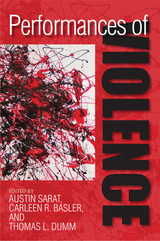
READERS
Browse our collection.
PUBLISHERS
See BiblioVault's publisher services.
STUDENT SERVICES
Files for college accessibility offices.
UChicago Accessibility Resources
home | accessibility | search | about | contact us
BiblioVault ® 2001 - 2024
The University of Chicago Press









